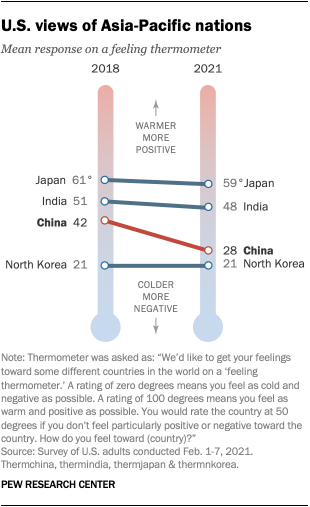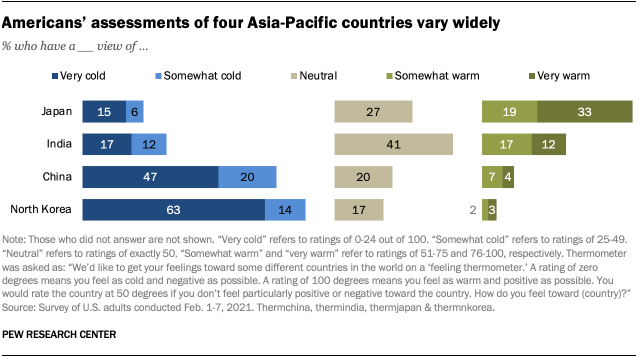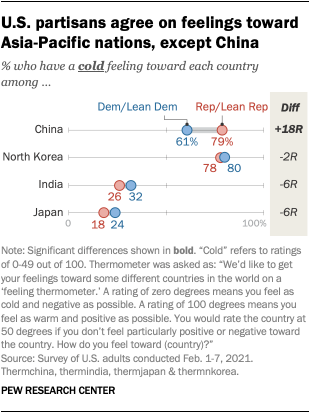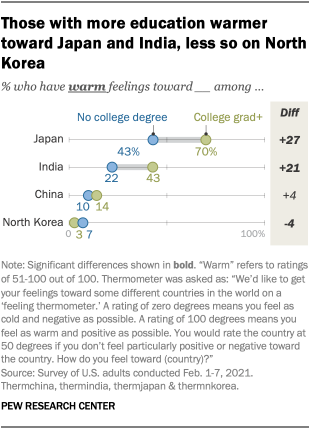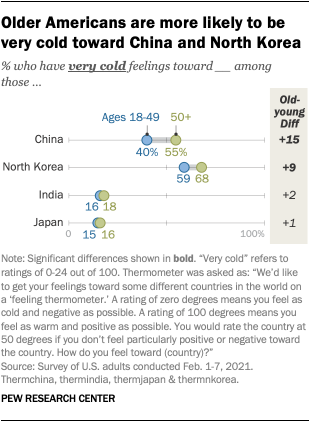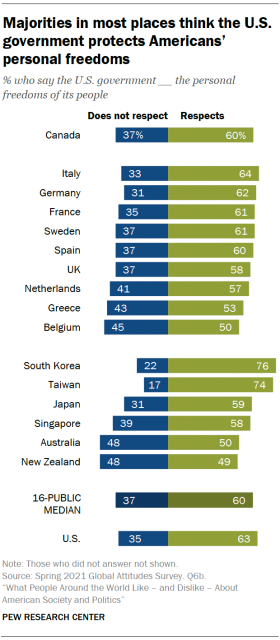Asia appears to be top of mind for the Biden administration when it comes to foreign policy. Japan and South Korea were the first two international destinations of Cabinet officials after Joe Biden’s inauguration as U.S. president. Looking to coordinate in the face of China’s efforts to assert itself in the region, the administration initiated a first-of-its-kind “Quad” summit with the leaders of Australia, India and Japan. The United States also held a high-level, in-person meeting with key Chinese officials in mid-March.
As Americans eye the Asia-Pacific region, they see a mix of friends and some foes, according to a new Pew Research Center survey conducted Feb. 1-7, 2021. Asked to rate their feelings toward four countries in the region on a “feeling thermometer,” where a 0 indicates the coldest and most negative rating possible, 50 indicates a neutral rating, and 100 indicates the warmest and most positive rating possible, Americans generally have warm feelings toward Japan. They give the country an average rating of 59 – largely unchanged since 2018, when the country had an average rating of 61. India receives a more neutral rating of 48 – also largely unchanged from its average rating of 51 in 2018.
Pew Research Center conducted this study to understand Americans’ views toward countries in the Asia-Pacific region at a time when China has increasingly sought to assert itself there. For this analysis, we surveyed 1,309 U.S. adults from Feb. 1 to 7, 2021. Everyone who took part in this survey is a member of the Center’s American Trends Panel (ATP), an online survey panel that is recruited through national, random sampling of residential addresses. This way nearly all U.S. adults have a chance of selection. The survey is weighted to be representative of the U.S. adult population by gender, race, ethnicity, partisan affiliation, education and other categories. Read more about the ATP’s methodology.
Here are the questions used for this report, along with responses, and its methodology.
But North Korea and China receive very negative ratings. In the case of North Korea, Americans are steadfastly cold toward the country: It receives an average rating of 21 this year, which is unchanged from 2018.
What is new is that strongly negative views of China have grown sharply. Whereas the country received an average rating of 42 in 2018, this has dropped sharply to 28 this year. The same survey found negative views toward China across a range of other measures. These shifts come amid concerns about bilateral economic relations, criticism of China’s role in the outbreak of COVID-19 and widespread recognition of China’s human rights abuses.
About half of Americans have warm feelings toward Japan; four-in-ten are neutral toward India
Exploring the ratings in more detail, it appears that Biden’s prioritizing of relations with Japan – one of the United States’ foremost allies in the region – will likely sit well with Americans. About half (52%) express warm feelings toward the country (rating it above 50 on the 0-100 scale), with a third of Americans even indicating very warm views (between 75 and 100).
In the case of India, a plurality of Americans (41%) express neutral views – exactly 50 on the feeling thermometer. Equal shares say they have either cold (29%) or warm (29%) views of the country.
Both China and North Korea not only receive majority cold ratings from the public – 67% and 77%, respectively – but in both cases, the bulk of the cold ratings are very cold. A strong majority of Americans feel very cold toward North Korea, while roughly half have a similar view of China. In fact, sizable shares rated China and North Korea as a zero out of 100, the coldest possible rating (24% and 34%, respectively). For North Korea, this is largely unchanged from 2018, when 30% of Americans gave North Korea a zero. For China, however, this is up sharply from just 9% in 2018.
Partisanship, education, age and gender are related to views of some Asia-Pacific countries
Republicans and Democrats in the U.S. differ sharply in their opinions of China: 79% of Republicans and Republican-leaning independents feel cold toward China, compared with just 61% of Democrats and Democratic-leaning independents. And while a partisan gap in negative views persists, attitudes on both sides of the partisan divide have turned more negative toward China in recent years, with a roughly 20 percentage point increase in cold views among Republicans and Democrats alike.
However, when it comes to views of the other three Asia-Pacific countries, partisans mostly agree. The same was largely true in 2018, when partisans gave North Korea and Japan roughly equal ratings – though at the time, Democrats were slightly warmer toward India than Republicans.
Those with more education tend to feel more positively toward Japan and India than those with less education. A full 70% of Americans with at least a college degree have a warm view of Japan, while just 43% of those with less education say the same. In the case of India, the gap is a narrower 21 points (43% of those who have a college degree or more have warm feelings, compared with 22% of those with less schooling). Those who have less than a college degree are also more likely to say they feel neutral toward India.
Education also bears on views of China: Those with at least a bachelor’s degree are less likely to feel very cold toward China than those with less education (39% vs. 51%, respectively).
Only in the case of North Korea is the pattern reversed. Those with at least a college degree are more likely to say they have very cold feelings toward North Korea than those with less education (68% vs. 61%). Those with lower levels of education are also more likely to say they have no opinion either way.
On China and North Korea, Americans’ opinions differ across age groups: Older people (ages 50+) are more likely than younger ones (ages 18 to 49) to have very cold feelings about the two countries. On China, this gap is 15 percentage points, with 55% of older Americans and 40% of younger Americans holding this view. The gap is somewhat smaller on North Korea (68% vs. 59%, respectively). There are no age differences when it comes to views of Japan or India.
Men are significantly warmer toward Japan and India than women. For example, around two-thirds of men say they feel warmly toward Japan, while just 40% of women say the same. On India, roughly a third of men (35%) have warm feelings, while just a quarter of women say the same, a 10-point gap. On the other hand, men are more likely to feel very cold toward China and North Korea than women. Roughly half (51%) of men and 43% of women have very cold feelings toward China, and fully two-thirds of men feel very cold toward North Korea, compared with 58% of women. On all four countries polled, women are more likely than men to say they feel neutrally.
Views toward the four countries polled are generally warmer among those who are internationally oriented. For example, those who say many of the United States’ problems can be solved by working with other countries tend to have more positive feelings toward each of the Asia-Pacific nations than those who say few of the United States’ problems can be solved this way. Similarly, those who say it is important that the U.S. be respected around the world tend to have warmer views of all countries tested except North Korea.
Those who say the U.S. should be active in world affairs also view other countries more positively than those who think the U.S. should concentrate on domestic problems. In the case of Japan, the gap is in the double digits (57% among those who favor an active role for the U.S., compared with 46% among those who don’t), though it is smaller when it comes to India (33% vs. 25%) and China (14% vs. 8%). There is no such difference on this issue for views of North Korea.
Note: Here are the questions used for this report, along with responses, and its methodology.
